#public policy consulting
Text
The Role of Legal Consulting in Your Business
Sequoia Strategies LLC provides expert legal consulting services to empower your business. Our team, led by a licensed attorney with over 20 years of experience, offers comprehensive guidance on navigating complex regulations, contracts, and legalities.pen_spark
#public affairs consulting#public policy consulting#government consulting firm#american political action committee#communications consulting firm#government strategy consulting#federal political action committee#local government consulting#legal consulting services#public policy and government
0 notes
Text
Idk if I like this job anymore. One client is making me miserable. Hopefully I’m done with that project by the end of the year because it’s really fucking with me. My other clients love me and we work very well together. I’m good at my job. But that isn’t really enough.
There are things I like about my job, but I’m not really passionate about it. Idk. It doesn’t excite me. Once my final two assignments are turned in for this semester (have we even started them? no.) I’m going to really give my best effort to find joy and satisfaction in my paid work. If I don’t, something will need to change.
When I was interviewing with different places at this time last year, I remember being interested in a health care data governance job. They ultimately hired someone internally for good reasons, but I know that’s something I could be good at.
Or MAYBE I’ll actually do something with this fucking graduate degree I’m about to have 🤣
#hmmmmmm I’ve been so tech focused for the past 6 years#do we go back to something related to politics/government/public policy?#a guy I graduated with who also majored in poli sci started in a state agency doing program management#then he left for tech consulting like me#and now he’s the public policy director for a non profit advocacy group#that was my dream….seven years ago 😅#idk what I want#is this a midlife crisis?#shit if it is I’ll just stop working now and enjoy the next 30 years
52 notes
·
View notes
Text
youtube
#How to Find and Be a Great Mentor with Terry Allen | KAJ Masterclass LIVE The Power of Mentorship: How to Find and Be a Great Mentor with Te#Founder#A Mentor for Me.
Terry Allen develops leaders#teaches#trains#and engages in hands-on mentoring. Allen enjoyed a 36-year career in the public policy arena as a Congressional staff member#think tank president#political campaign advisor#and for the last 23 years#as a consultant for some of America’s leading companies#Through his consulting practice he casts vision#frames issues#builds strategic coalitions#and solves problems.
kajmasterclass#Youtube
0 notes
Text
Interior Department Announces New Guidance to Honor and Elevate Hawaiian Language

"In commemoration of Mahina ʻŌlelo Hawaiʻi, or Hawaiian Language Month, and in recognition of its unique relationship with the Native Hawaiian Community, the Department of the Interior today announced new guidance on the use of the Hawaiian language.
A comprehensive new Departmental Manual chapter underscores the Department’s commitment to further integrating Indigenous Knowledge and cultural practices into conservation stewardship.
“Prioritizing the preservation of the Hawaiian language and culture and elevating Indigenous Knowledge is central to the Biden-Harris administration's work to meet the unique needs of the Native Hawaiian Community,” said Secretary Deb Haaland. “As we deploy historic resources to Hawaiʻi from President Biden’s Investing in America agenda, the Interior Department is committed to ensuring our internal policies and communications use accurate language and data."
Department bureaus and offices that engage in communication with the Native Hawaiian Community or produce documentation addressing places, resources, actions or interests in Hawaiʻi will use the new guidance on ‘ōlelo Hawaiʻi (Hawaiian language) for various identifications and references, including flora and fauna, cultural sites, geographic place names, and government units within the state. The guidance recognizes the evolving nature of ‘ōlelo Hawaiʻi and acknowledges the absence of a single authoritative source. While the Hawaiian Dictionary (Pukui & Elbert 2003) is designated as the baseline standard for non-geographic words and place names, Department bureaus and offices are encouraged to consult other standard works, as well as the Board on Geographic Names database.
Developed collaboratively and informed by ʻōlelo Hawaiʻi practitioners, instructors and advocates, the new guidance emerged from virtual consultation sessions and public comment in 2023 with the Native Hawaiian Community.
The new guidance aligns with the Biden-Harris administration’s commitment to strengthening relationships with the Native Hawaiian Community through efforts such as the Kapapahuliau Climate Resilience Program and Hawaiian Forest Bird Keystone Initiative. During her trip to Hawaiʻi in June, Secretary Haaland emphasized recognizing and including Indigenous Knowledge, promoting co-stewardship, protecting sacred sites, and recommitting to meaningful and robust consultation with the Native Hawaiian Community."
-via US Department of the Interior press release, February 1, 2024
--
Note: I'm an editor so I have no idea whether this comes off like as big a deal as it potentially is. But it is potentially going to establish and massively accelerate the adoption of correctly written Native Hawaiian language, as determined by Native Hawaiians.
Basically US government communications, documentations, and "style guides" (sets of rules to follow about how to write/format/publish something, etc.) can be incredibly influential, especially for topics where there isn't much other official guidance. This rule means that all government documents that mention Hawai'i, places in Hawai'i, Hawaiian plants and animals, etc. will have to be written the way Native Hawaiians say it should be written, and the correct way of writing Hawaiian conveys a lot more information about how the words are pronounced, too, which could spread correct pronunciations more widely.
It also means that, as far as the US government is concerned, this is The Correct Way to Write the Hawaiian Language. Which, as an editor who just read the guidance document, is super important. That's because you need the 'okina (' in words) and kahakō in order to tell apart sizeable sets of different words, because Hawaiian uses so many fewer consonants, they need more of other types of different sounds.
And the US government official policy on how to write Hawaiian is exactly what editors, publishers, newspapers, and magazines are going to look at, sooner or later, because it's what style guides are looking at. Style guides are the official various sets of rules that books/publications follow; they're also incredibly detailed - the one used for almost all book publishing, for example, the Chicago Manual of Style (CMoS), is over a thousand pages long.
One of the things that CMoS does is tell you the basic rules of and what specialist further sources they think you should use for writing different languages. They have a whole chapter dedicated to this. It's not that impressive on non-European languages yet, but we're due for a new edition (the 18th) of CMoS in the next oh two to four years, probably? Actually numbering wise they'd be due for one this year, except presumably they would've announced it by now if that was the case.
I'm expecting one of the biggest revisions to the 18th edition to add much more comprehensive guidance on non-Western languages. Considering how far we've come since 2017, when the last one was released, I'll be judging the shit out of them if they do otherwise. (And CMoS actually keep with the times decently enough.)
Which means, as long as there's at least a year or two for these new rules/spellings/orthographies to establish themselves before the next edition comes out, it's likely that just about every (legit) publisher will start using the new rules/spellings/orthographies.
And of course, it would expand much further from there.
#don't ask me about the magazine and newspaper half of this#bc I do Not know AP style#except the differences I'm annoyed at lol#ap doesn't respect the oxford comma#hawaii#hawaiʻi#language#orthography#linguistics#language stuff#hawaiian#native hawaiian#united states#publishing#book publishing#indigenous#indigineous people#indigenous languages#language revitalization#language resources#editorial
389 notes
·
View notes
Text
An Account of the Current OTW/AO3 Allegations
You may have seen talk flying around about drama going down with OTW (the Organization for Transformative Works) and AO3. There isn't a clear write-up of the situation on Tumblr, and since the allegations in this case are serious and OTW Board elections are coming up, I thought there should be a resource for people to get some basic understanding about the events.
This account is a burner, because the topics here are deeply charged, and I don't want to become a character in what's happening. I am not a member of or volunteer for OTW; I am not affiliated with End OTW Racism; I am not affiliated with Dreamwidth; I do not personally know any of the people involved in these events, or have personal knowledge of the events themselves. I am only compiling the publicly available events, allegations, and discussion into a convenient format for Tumblr. I will be heavily referencing the the similar compilation put together by Dreamwidth user Synonymous, but I am not Synonymous, nor do I know who they are. I am not, however, completely without bias; for one thing, I am writing this with the clear understanding that I believe OTW's treatment of its volunteers and policies on content moderation are both deeply troubling. If I did not believe that, I wouldn't have bothered writing this post.
This write-up includes events relating both to allegations about volunteer abuse and improper handling of CSEM moderation by the OTW, and to arguments made about the OTW's handling of racist conduct and about End OTW Racism's ties to the writer known as Stitch. I am including both of these threads because they are deeply related both causally and in the arguments of many of the people involved, and because volunteer abuse, CSEM, and racist harassment are all deeply serious problems.
This situation has not resolved, and therefore you can likely expect more to occur, probably relating to all of those topics. I have not yet decided whether I will continue updating this timeline, but it should at least give you a grounding in what's happening.
Heavy Content Warning for discussions of child sexual abuse material; abuse, harassment, and stalking; and interpersonal and systemic racism. All language in this write-up is non-graphic and high-level, but some links include more detailed descriptions.
The Events
June 24, 2020: In the wake of George Floyd's murder and in response to pressure from people including Black writer Stitch (of the blog Stitch Media Mix and Teen Vogue) and fan studies academic Dr. Rukmini Pande, the OTW makes a statement promising to review their policies and procedures and take steps to protect users from racist harassment. The specific promises they make are:
Giving creators more control over the comments on their works.
Improving collection searching and filtering.
Improving admin tools for responding to Policy & Abuse reports.
Reviewing the Terms of Service to potentially allow Policy & Abuse to respond to more kinds of reports.
Reassess the required Archive Warnings and consider adding more.
Continue working on user muting and blocking.
They also say that they are considering "reaching out to an external contractor or partnering with an advocacy group," i.e., a diversity consultant, to help with reforms.
August 8, 2021: As part of their July newsletter, the OTW announces that it is creating a new officer role in the organization to research options for diversity consultants.
May 7, 2022: The OTW makes a public statement on their website that an unknown attacker has sent CSAM (child sexual abuse material) to some of their volunteers' email addresses, that they are working with authorities to find the attacker, and that response times may be slower than usual, as they have "shut down a number of internal tools" in order to protect their volunteers and the investigation.
May 8, 2022: Dreamwidth cofounder and former head of LiveJournal Trust & Safety Denise (rahaeli on Twitter, synecdochic on Dreamwidth) posts a Twitter thread urging any current or former OTW/AO3 volunteer who has provided the organization with their real-life name ("wallet name") to contact their local police department and let them know that they are at an elevated risk of swatting. She also provides advice on disabling image auto-loading in emails and dealing with trauma and anxiety from being exposed to CSAM, and mentions that she has contacted AO3 to offer help.
June 16, 2022: As part of their April newsletter (delayed several months due to the CSAM attack), the OTW announces that a Diversity Consultant Research Officer has been appointed.
May 10, 2023: The Tumblr account end-otw-racism publishes its first post, End OTW Racism: A Call to Action. In it, the anonymous authors call on the OTW to implement the changes that they promised in 2020, especially:
Hiring a diversity consultant within the next 3-6 months.
Updating their harassment policies and protocols to address on-site and off-site coordinated harassment.
Creating a content policy for content that is abusive in a racist manner.
As part of their background establishing the problem of racist abuse and harassment in fandom, they link to several articles written by Stitch on their commentary blog, as well as a couple of posts from other fans.
In their FAQs and other posts, the organizers of EOR clarify that they are not calling for the removal of any racist fic, but fic that is written specifically with the intention of perpetrating racist harassment or abuse. They also urge supporters not to berate or harass anyone for disagreeing with or failing to support their campaign.
May 17, 2023: An anonymous user asks about the End OTW Racism protest on the anon-meme Dreamwidth community Fail Fandom_Anon (FFA). As part of a tangent in that discussion, an anonymous former volunteer member of the OTW's Policy & Abuse Committee (PAC) mentions that they handled CSEM (child sexual exploitation material) tickets as part of their work, and that the OTW did not provide sufficient resources or expertise in dealing with them either emotionally or logistically. They describe themselves as being traumatized, burned out, and overworked during their time in PAC. They also mention that there was an earlier CSAM attack, targeted only at PAC volunteers, prior to the one that the OTW announced; that they were the volunteer who handled reporting to law enforcement; that the PAC chairs urged Legal and the Board to prepare for more attacks, but that nothing was done; and that the OTW did not provide any mental health resources for volunteers after the CSAM attack. (Here is a link to the user's top-level comment; read down the thread for more.)
May 20, 2023: Dreamwidth user chestnut_pod posts an entry called Be More Democratic, Be More Autocratic, OTW. The thesis of their post is that the OTW fails to adequately respond to racism on AO3 because of structural problems within the organization that amplify biases and make change difficult to achieve, and that in order to address racism and other problems more effectively, the organization should create a clear and straightforward command structure. They also advocate for creating some paid roles within the organization. The comments of the post become a kind of referendum on OTW's organizational policies, and some former volunteers show up to say that chestnut_pod's description of the problems with the org's structure tally with their experience.
May 23, 2023:
An anonymous user links to chestnut_pod's post on FFA. In response, the same former OTW volunteer describes various details of how the Policy & Abuse Committee (PAC) made decisions during her time there. (The description covers a lot of comments, so with one exception I'm linking to Synonymous's overview rather than the individual comments, but you can find all of them either through Synonymous's links or by reading down the FFA thread.) The upshot is that PAC often found it difficult to address racism, abuse, and harassment due to roadblocks and micromanagement from OTW's Legal Committee. In particular, the user mentions that they wanted to remove photo manipulations of real-life minors engaging in sex, as well as ambiguously-sourced explicit gifs from underage fics, and were told that they could not by Legal. (I have described the user's objections at as a high a level as possible, but the language used at the link is much more detailed and explicit.) A subsequent, current OTW volunteer says that since the first user left, the policy has changed to allow PAC to remove similar gifs.
Denise leaves a series of comments on chestnut_pod's post saying that the PAC policies described there run counter to industry best practices for Trust & Safety. In response to a commenter asking whether she could advise OTW, Denise says that she has offered several times, and only heard back from the organization once: after she posted her Twitter thread in response to the CSAM attacks, "at which point it immediately became extremely clear the person in question was more interested in protecting the external reputation of the organization than in listening to any advice I had to give and the only reason they'd contacted me was to pressure me to remove my Twitter thread."
In response to Denise's story, Dreamwidth user azarias reveals herself to be the anonymous former PAC volunteer on FFA. In a series of comments on chestnut_pod's post and FFA (bulk of the information in this comment, but see Synonymous's compilation or read up and down the thread for more), she relays the following story:
On May 6, 2022, shortly after the CSAM attack, azarias was kicked out of the OTW volunteer Slack with no notice and no communication. When she realized several days later that this was not an organization-wide shut down, she emailed the OTW Board, Legal, and the PAC chairs asking about the situation, and whether she was a suspect in the attack. The chair of Legal, Betsy Rosenblatt, responded, apologizing for the lack of communication and saying that the shut-out was at Legal's request because they thought azarias' account may have been compromised, but she was not a suspect. On July 22, 2022, having heard nothing further from the OTW, azarias emailed again asking about reinstatement, and Betsy responded that they had just that day started that process. (EDIT: Azarias clarifies that her original stated date of July 22 was an error; she checked on her status July 4, and Betsy responded July 6.) All of azarias's accounts had been deleted, so she returned to the OTW with new accounts, and was informed by her PAC chairs that they were not consulted or informed about her suspension until it happened, were not told why she had been suspended, and were ordered not to speak to or about her during the suspension. Due to awkwardness, trauma, and burn-out, azarias quit volunteering soon after.
May 30, 2023:
On FFA, an anonymous OTW volunteer (not azarias) comments that the OTW Board has posted an update to Slack addressing azarias's story (though she is never named in the update). The update confirms that Legal made the decision to suspend azarias, and says that the Board was not consulted on or informed about the decision to either suspend or reinstate her. A statement from Legal is also attached. The statement does not in any way dispute azarias's timeline of events, and outwardly apologizes to her for the distressed caused, but it also contains several strong insinuations that the letter-writer believes that azarias was responsible for the CSAM attack.
In response to this letter, Denise posts a statement on Dreamwidth and Twitter recommending that any person currently volunteering for the OTW should resign for their own personal safety.
June 3, 2023: Azarias (now posting under her real account, which FFA allows people who are players in the events being discussed to do) comments on FFA that she has consulted a lawyer regarding Legal's insinuation, and has been advised that she doesn't have anything to worry about, legally. She explains some more of the details behind the situation, and discusses some of her guesses about the current situation at the OTW. (For clarification, the Heidi she's referring to is Heidi Tandy, a longtime member of OTW Legal. During the heights of Harry Potter fandom, Fandom Wank coined the term "Heidipology" to describe what they believed to be Heidi's pattern of making insincere, backhanded apologies.) In the comments, anonymous users discuss the fact that OTW's Legal team is made up entirely of IP lawyers, and not lawyers who have expertise in criminal law, nonprofit governance, or Trust & Safety. (Link goes to Synonymous's compilation.)
June 12, 2023: The OTW publishes a statement addressing the End OTW Racism protest. They thank the organizers for holding them accountable, list the steps they've already taken in addressing racism (mostly muting/blocking abilities and similar), and reiterate that they are working on hiring a diversity consultant and reviewing PAC policies. They also say they will improve transparency and communication.
In the comments, azarias (and several others) push the OTW for a retraction of Legal's letter. Azarias also pushes the OTW to make real progress on racist abuse, rather than paying it "lip service." Azarias reveals that she was the Board's original pick for the Diversity Consultant Research Officer, but dropped out. (Further comments later and earlier at FFA clarify that she dropped out due to the OTW's one name policy, which requires that all work that a volunteer does for the OTW be done under a single name; officers are required to serve under their wallet names, and azarias wanted to do her PAC work under her fandom name and not link that to her wallet name, and when OTW didn't let her, she resigned. Link to Synonymous's more thorough compilation of this story here.)
Also in the comments, several users respond to the OTW's statement by posting racist abuse and racial slurs. The OTW leaves the comments up for several days before finally screening them.
June 15, 2023: Denise posts a thread on Twitter, shortly after compiled on her Dreamwidth, laying out what she consider's the OTW's "absolute failure" at Trust & Safety. Among other things, she claims that:
Photomanips of minors in sexual situations, "however terrible or obvious the Photoshop job is, qualifies under the third definition of 'child pornography' as given in 18 USC §2256(8)(C)."
She believes that the OTW may not be in compliance with legal obligations to preserve information about reported CSEM, due to its policy of deleting author information about orphaned works.
In this post, Denise also elaborates on the story she told in the comments of chestnut_pod's post. She says that in May 2022, before the OTW made its statement about the CSAM attack, several volunteers reached out to her for advice, and she learned that the attack emails included threats to expose identifying volunteer information to, among other places, Kiwi Farms, a site whose users have previously swatted many people. In response to this, after the OTW's statement, she published her Twitter thread advising volunteers to alert their local law enforcement, and also reached out to the OTW to offer resources, contacts, and advice. In response, OTW Legal member Rebecca Tushnet called her and spent half an hour pressuring her to remove her Twitter thread.
At the end of the post, Denise briefly touches on the End OTW Racism action that began this conversation, saying that she appreciates their work, but believes that their proposed solutions will not be effective, both because the OTW's organizational dysfunction makes it impossible for them to moderate racist content, and because PAC must moderate "conduct, not content." She says that she "firmly disagree[s] with the foundational work their campaign was built on."
June 16, 2023:
In response to several people asking for clarification on her statements about End OTW Racism, Denise posts a follow-up Twitter thread (which has not at this time been crossposted to Dreamwidth). She says that a diversity consultant will not effectively address abuse because the current OTW culture is resistant to change, and that reviewing TOS policies will not be effective, because the current TOS already allows for moderation of abusive conduct, but PAC has not been empowered to enforce it. Instead, she claims that progress on moderation of racist abuse can only truly be made once the organization's systemic issues have been addressed. She also believes that End OTW Racism's messaging is counterproductive, "because of its repeated failure to differentiate between content and conduct." In particular, she argues that, "by citing so heavily to the foundational background work by people who *have* repeatedly called for bans on work that 'reflects racist and bigoted stereotypes', and by failing to differentiate the two except in passing, the campaign has positioned itself in such a way that it will be, and I'm certain has already been, dismissed by the OTW." She does not mention Stitch by name, but it is clear by context that it is the citations of Stitch's work that she is referring to.
After someone DMs her to request she take down her clarifying statements about End OTW Racism, and various people supportive of EOR on Twitter denounce the statements, Denise posts a follow-up statement to Dreamwidth and to Twitter. She says that she has been contacted several times over the past few weeks by Black fans who have been harassed and abused by Stitch in racist and racialized ways, and who showed her screenshots of these interactions, which Stitch has since deleted. She says that because these fans are afraid to speak up for fear of further harassment, she offered to relay their concerns about a campaign based heavily on Stitch's writing. She does not provide the screenshots, in order to prevent the fans from being identified. She reiterates that she agrees with Stitch and with EOR that the OTW is failing to respond to racist abuse and harassment, but that she disagrees with their approach and proposals.
(For what it's worth, as I said up front, I am not personally acquainted with either Stitch or Denise, and have no personal knowledge of events, but Denise is not the first person to accuse Stitch of racist harassment. There has been a great deal of discussion on FFA, both well-sourced and not so much, detailing Stitch's past behavior. I am linking to this round-up so that people can find it, but with the exception of those that directly link to the evidence, and one or two that reference Stitch's public writing, I do not know the accuracy of any of the claims, and I do not know the source of some of them. The allegations listed also vary wildly in their degree of seriousness, ranging from "actually harassed someone" to "said something distasteful," to "is friends with a known serial stalker and harasser.")
The OTW posts a newspost addressing Denise's original (June 15) thread and allegations. The say that they are in legal compliance with CSEM reporting procedures, that they provided resources to volunteers following the CSAM attacks, and that "the Legal Committee has always worked closely and cooperatively with the Policy & Abuse Committee, and continues to do so." They do not reference azalias's accusations or Denise's claim to have been pressured by Rebecca Tushnet.
In the comments, azarias, Denise, and many other users, both anonymous and signed, express outrage at the OTW, and push for answers, apologies, retractions, and in some cases the resignation of Legal and/or the Board.
End OTW Racism posts a statement acknowledging the OTW's acknowledgment, and calling for supporters to donate to the OTW so that they can vote in the upcoming Board elections.
June 16-18, 2023: A group of people on Twitter, Tumblr, and Dreamwidth post individually and in conversation about Denise's comments on Stitch and End OTW Racism, defending Stitch and arguing that Denise's claims about them and disagreement with their and EOR's work are racist, unfounded or overblown, and a derailment from EOR's mission. Some of these are the same people who are in the comments of the OTW's response to Denise, pushing for the OTW to respond to azarias's allegations. (These are not inherently contradictory positions; I just want to note that both the personal and ideological stances here do not necessarily line up neatly into, say, pro-OTW and anti-OTW.) See, for instance, naye's Dreamwidth post, fiercynn's Dreamwidth post, or pearwaldorf's Tumblr post.
June 18, 2023: Denise posts a Twitter thread going into much greater detail about the number of fans of color who reported to her that Stitch had harassed them ("a number greater than five and less than fifteen"), and the severity of their claims ("Several of them said the harassment they experienced was so severe and pervasive that it caused them to change screen names, leave fandom, or otherwise restrict their conduct online.") She also gives a detailed, step-by-step outline of how she went about verifying their claims to her own satisfaction. She continues not to give out identifying details to prevent further harassment.
[Updated June 19, 2023 to correct language around the attack on OTW, which was a CSAM attack, not a CSEM attack.]
1K notes
·
View notes
Text
A Rundown of Henry Kissinger's Life
“Once you’ve been to Cambodia, you’ll never stop wanting to beat Henry Kissinger to death with your bare hands. You will never again be able to open a newspaper and read about that treacherous, prevaricating, murderous scumbag sitting down for a nice chat with Charlie Rose or attending some black-tie affair for a new glossy magazine without choking. Witness what Henry did in Cambodia – the fruits of his genius for statesmanship – and you will never understand why he’s not sitting in the dock at The Hague next to Milošević. While Henry continues to nibble nori rolls and remaki at A-list parties, Cambodia, the neutral nation he secretly and illegally bombed, invaded, undermined, and then threw to the dogs, is still trying to raise itself up on its one remaining leg.”
--Anthony Bourdain (2018)
It's difficult to be precise, but all told Henry Kissinger killed hundreds of thousands of civilians in pursuit of American business interests.
EARLY LIFE
Henry Kissinger was born in 1923 as Heinz Kissinger in Fürth, Bavaria, Germany, to a German-Jewish family. Throughout his youth, he was relentlessly and violently harassed and discriminated against by members of the Hitler Youth and authorities. At the age of 15, Kissinger and his family fled Nazi Germany, settling in New York City. He finished high school at George Washington High School in NYC and began studying accounting at the City College of New York, but his undergraduate studies were interrupted in 1943 when he was drafted into the US army.
In the army, fluent German speakers were in short supply, so Kissinger was quickly assigned to military intelligence. During the American invasion of Germany, he worked to set up civilian administration of conquered cities and tracked down Gestapo officers as a Special Agent of the Counter Intelligence Corps. He received the Bronze Star Medal
After his time in the army, Kissinger returned to his studies. He graduated summa cum laude in political science from Harvard College, as well as his Masters and PhD. He taught at Harvard, and his studies focused on international 'legitimacy', when an international order is widely accepted by international leaders, without regard to public opinion or morality.
POLITICS
Beginning in the 1950s, Kissinger began to be more active on the political stage. He was a consultant for the National Security Council and a study director for the Council of Foreign Relations. He notably was against Eisenhower's massive retaliation nuclear doctrine, where the United States would respond to a nuclear attack with a much, much greater nuclear attack. Instead, Kissinger advocated the use of tactical nuclear weapons on a regular basis in more wars.
In the 1960s, Kissinger began working with Republicans running for office as an advisor in foreign affairs. He contributed to the Nixon campaign, and when Nixon took office in 1969, Kissinger was appointed as National Security Advisor, and later Secretary of State. As a diplomat, Kissinger heavily used Realpolitik, the in-fashion Cold War approach focusing on pragmatism and realistic outcomes rather than ideological or moral purity. In international politics, it largely has to do with obtaining and maintaining power on the world stage.
Kissinger focused on relaxing US tensions with the USSR and China, leading an American foreign policy that supported Taiwan on the face but in the shadows removed all support for Taiwan and essentially waited for it to fall apart.
In 1974, he directed the National Security Study Memorandum 200: Implications of Worldwide Population Growth for U.S. Security and Overseas Interests (NSSM200), sometimes called the "Kissinger Report" the official United States policy for many years, though it remained classified until the 1990s. The Kissinger Report advocated for population control in undeveloped nations to ensure easy resource extraction and protect American business interests abroad. Projects were designed to reduce fertility while keeping up the appearance of improving quality of life--the plan specifically attempted to avoid an appearance of "economic or racial imperialism". Birth rate was particularly noted due to concerns about an adequate global food supply and because young people more readily fight back against corruption and imperialism. The Report also brought up increasing abortion rates as a method of obtaining this goal.
In 1975, policies based on the Report went into affect. The National Security Council would recommend withholding food and using military force to prevent population growth, prioritizing aid for small families, and even paying people to get sterilized. Thirteen countries were named as particularly problematic to US interests. Of note, Nigeria lost development and the United States took control of Nigerian resources, and the United States Agency for International Development (USAID) was responsible for some of the 300,000 forced sterilizations in Peru--largely impoverished or indigenous women--during the Fujimori administration. The Fujimori government has been accused of crimes against humanity by the International Criminal Court for these abuses, and today the Peruvian economy suffers due to the low population resulting from these sterilizations.
ACTIONS IN SOUTHEAST ASIA
The Vietnam War had started back in 1955. Kissinger had originally supported it, but as time dragged on began to view it as harming American prestige. Kissinger leaked information about peace talks to get into power at Nixon's side, and then failed to end the war in 1972, leading to the Christmas bombings. A very similar agreement was signed the next month, leading to a ceasefire (that would collapse) and the withdrawal of American troops--bitterly seen as a betrayal by South Vietnam. When Kissinger and Vietnamese diplomat Lê Đức Thọ were jointly awarded the Nobel Peace Prize for this, Thọ declined to accept it and two members of the Nobel Committee left it in protest.
It was in the middle of the Vietnam War, and during the Cambodian Civil War, that Operation Menu and Operational Freedom Deal went into play. From March 1969 to May 1970, the United States Strategic Air Command carried out a series of first tactical and then carpet bombings in eastern Cambodia. Then, from May 1970 to August 1973, the United States provided close air support and widespread bombing. Part of a 'secret' war to support the Kingdom of Cambodia/Khmer Republic against communist rebels, it ultimately failed and the communists would take power in 1975.
In the Bangladesh Liberation War in 1971, Nixon and Kissinger supported the Pakistani president Yahya Khan. It was in this that the strongest dissent in the history of the U.S. Foreign Service, the Blood Telegram (named after sender Archer Blood), was sent. It reports the US was about to lose, describes systemic abuses, and uses the word 'genocide' to describe the actions by US-supported Pakistan. It said the US government was morally bankrupt. Blood was recalled early from Bangladesh, and US interests were lost when Bangladeshi Independence was secured within the year.
MIDDLE EASTERN POLICY
Kissinger was originally excluded from any policy-making on Israel, as part of Nixon's orders to exclude all Jewish-Americans from such work. Still, in 1973, when Kissinger became Secretary of State, he was included in all US Middle Eastern policy. This means he was largely responsible for the handling of the Yom Kippur War--this handling included not noticing precipitating factors leading up to it (he was so engrossed in Paris peace talks he didn't notice the Egyptian President Sadat ready to move on Sinai), delaying telling Nixon about and stalled negotiating a ceasefire, hoping Israel would push across and fully obtain the Suez Canal.
Kissinger's diplomacy included giving equipment to Israel, but not as much as he'd promised, and selling weapons to Saudi Arabia at the same time, in exchange for access to Saudi Arabian oil. By largely handling to event and not involving France or the United Kingdom, and by minimizing the power of the Soviet Union, Kissinger took large steps in giving US power over much of the Middle East.
It should be noted that this was done purely to protect US interests rather than any form of Jewish security. When questioned about the persecution of Soviet Jews at the same time, Kissinger said
"The emigration of Jews from the Soviet Union is not an objective of American foreign policy, and if they put Jews into gas chambers in the Soviet Union, it is not an American concern. Maybe a humanitarian concern."
-Henry Kissinger (1973)
Also in the region., Kissinger supported Iran against Iraq.
TURKISH INVASION OF CYPRUS
In 1974, the Greek military regime and Turkiye invaded the island of Cyprus. The military regime had been supported by Kissinger, and anti-Kissinger sentiment was strong among young people. Cyprus is now an independent island country, though its northeast portion is de facto separate, making up the self-declared Turkish Republic of Northern Cyprus. Kissinger considers his own handling of the Cyprus Issue unfavorably.
LATIN AMERICA
With Kissinger's influence, the United States maintained relations with non-left-wing governments regardless of commitment to democracy. It was with Kissinger's input that the CIA encouraged a military coup against Chilean president-elect Salvador Allende due to his socialist ideals.
Operation Condor, a US-backed program of political repression by right-wing dictatorships of southern South America, was also Kissinger's work. It included assassinations, the Dirty War in Argentina, and supporting Brazil's nuclear weapons program because it would benefit the U.S. private nuclear industry.
SOME OTHER STUFF
Kissinger's policy on post-WWII decolonization was mixed, based on what would benefit the U.S. He helped transition Rhodesia (now Zimbabwe) away from White minority rule, expressed moderate support for the Portuguese Colonial Empire, and helped Indonesia occupy East Timor.
After Watergate forced Nixon to resign, Kissinger stayed on under President Ford but left office when Democrat Jimmy Carter came into power. He was offered an endowed chair at Columbia University, which was canceled due to student opposition, but was appointed to Georgetown University instead. He ran a consulting firm, supported the Chinese government in the Tiananmen Square massacre, and served on the 2000 Commission of the International Olympic Committee. He was supposed to help President Bush respond to the 9/11 attacks but stepped down because he refused to reveal if he had a business conflict of interest.
In 2010, he took a strong stance urging world governments to destroy all nuclear weapons. In the 2014 Ukrainian crisis, he said that Crimea should remain under Ukrainian sovereignty, but in the 2022 Russian invasion of Ukraine said that Crimea and Donbas should be given to Russia.
Kissinger was a board member of Theranos, Elizabeth Holmes' biotech scam.
In response to the 2023 Hamas attack on Israel, and seeing pro-Palestinian protestors in Germany, Kissinger called Muslim immigration into Germany "a grave mistake".
DEATH
Kissinger died peacefully in his home in Connecticut on November 29th, 2023,
#history#destiel#henry kissinger#imperialism#anti imperialism#if any of you use this as an excuse to be antisemitic or prolife im coming for all your bones
223 notes
·
View notes
Text
i just found something incredible today while browsing retractionwatch. you know that study that liberals tout regarding 'legalising prostitution decreased rape, and criminalising it increases rape'? well-
After reading an economics paper that claimed to document an increase in the rate of rape in European countries following the passage of prostitution bans, a data scientist had questions.
The scientist, who wishes to remain anonymous, sent a detailed email to an editor of the Journal of Law and Economics, which had published the paper last November, outlining concerns about the data and methods the authors used.
Among them: the historical rates of rape recorded in the paper did not match the values in the official sources the authors said they used. In other cases, data that were available from the official sources were missing in the paper, the researchers didn’t incorporate all the data they had collected into their model, and a variable was coded inconsistently, the data scientist wrote. (We’ve made the full critique available here.)
Given the consequences the conclusions of the article could have for people in the sex industry, the data scientist wrote, “I hope that someone takes this very seriously and looks into it the [sic] validity of the analysis and the data they used.”
In response, Sam Peltzman, an editor of the journal and a professor emeritus of economics at the University of Chicago’s Booth School of Business, instructed the data scientist to contact the authors of the article:
The email raises serious questions but without any specific request. Your questions can better be answered by the authors than editors who, as you must know, cannot give each submission the kind of careful attention reflected in your email. Accordingly, we ask that you contact the authors directly if you have not already done so.
If you mean the email as a prologue to a critique, I am happy to discuss our relevant policies or any other question about our editorial process.
The data scientist wrote back with a specific request:
I have just informed you, the editor, that it appears that the authors made an error in at least one of their models that resulted in a substantive difference in the conclusions of the article you edited … I am requesting you investigate if these models are correct and if so, at very least issue a correction. [emphasis original]
In response, Peltzman reiterated his refusal to investigate:
I can only repeat what was in my last letter. You should take this up with the authors first. The editors cannot become involved unless your conversation with the authors fails to resolve the issues and a comment is received through the usual submission process.
The University of Chicago Press, which publishes the Journal of Law and Economics, states on its publication ethics page that
When notified of possible errors or corrections, the editor(s) of the journal will review and resolve them in consultation with the Press and according to the Press’s best practices.
We asked Peltzman why he refused to investigate the concerns the data scientist had raised. He told us:
The JLE does not have the resources to investigate concerns about data procedure used by authors.
We select referees knowledgeable about the topic of any submission. Occasionally a referee might comment on some detail of data used by authors. more often the referee and editors have to take data details at face value and focus their efforts on evaluating empirical results and analysis. While I can only speak for the JLE it is my impression that these procedures are common among economics journals that publish empirical articles.
Peltzman also explained that the journal’s standard procedure for considering critiques of published articles, “designed to avoid misunderstanding and excessive burden on editors’ and referees’ time,” starts with the critic contacting the authors directly.
If the authors don’t respond, or if their response is unsatisfactory, the critic could then submit a comment to the journal along with their correspondence with the authors, which the editors would handle as any other submission.
“Editors obviously cannot be expected to look at raw data for every paper they review,” the data scientist acknowledged, “but when concerns are brought directly to them it is their responsibility to take them seriously. If readers can’t trust that editors will address serious concerns appropriately, it will undermine their faith in the scientific process.”
We contacted the authors of the paper, Huasheng Gao and Vanya Stefanova Petrova of Fudan University’s Fanhai International School of Finance in Shanghai, and shared the data scientist’s critique. They responded with an 11-page PDF, available here, standing by their work.
About the differences between the data and their paper and the official sources, they said:
the data we have used in the paper were the most up-to-date data available at the time we started the empirical work in 2018 … Eurostat is constantly revising its data. It is possible that the data contained in its current version are different from the historical version
The data scientist was unimpressed, and noted that the authors had not responded to a key aspect of the critique:
Even if the authors believe it was a reasonable strategy to only assess two years post policy change, the relative year variable for year 2— the year in which they identified a large causal increase in rape in the criminalized prostitution countries and a reduction in the prostitution decriminalized countries — was coded incorrectly (or differently for some reason). When the coding is consistent with their original coding scheme, a reduction in rape is seen in the criminalized prostitution group. I’m not sure why they didn’t address this in their response.
The authors also did not directly respond to the data scientist’s concern that if they had incorporated every year of data they had on rape rates into their model, instead of only the two years following a change in prostitution laws, they would not have gotten the same results, the scientist said.
To check whether data values had indeed changed since the authors started their work, the scientist went to the website of the University of Michigan’s Institute for Social Research, where the survey data the authors used is available for download, and found that no substantive changes had been made.
The scientist told us:
If they did something wrong or made a mistake they should just take accountability and retract the article.
let me simplify and repeat the core of this to you:
the scientists not only missed out data points, but if the scope of the study changes from the first two years post law change (whether criminalisation or decriminalisation) to all years of rape records before and after we have, THE RESULTS REVERSE AND THE CRIMINALISED SIDE HAS DECREASED RATE OF RAPE COMPARED TO SWITCHING TO DECRIMINALISED.
not to mention the fallacious belief that being forced to have sex or starve/be homeless, with an abusive pimp taking most of your money, is somehow not rape.
this whole study is near worthless. the only worth is having access to the data points they used, so we can see actual results.
459 notes
·
View notes
Note
Hi, what do you think about this news?
BBC News - Climate: NFU Cymru opts out of farming scheme over tree planting
Interesting, isn't it?
Here's the thing: it is a fact that we need more trees than we currently have, that Wales is under-forested, and that decades of inaction mean we now have to make big changes fast rather than incremental changes safely. Given that the Welsh Government is actively trying to base modern Welsh identity on environmentalism (we are the only country in the entire world with dedicated sustainability legislation in the form of the Wellbeing of Future Generations Act, and we're third in the world for recycling rates), it was inevitable that they were going to seize the bull by the horns, so to speak, and set a strict target.
In fact, they have past form for this - there's a reason we're third in the world for recycling. I am simplifying this massively and going to make any lawyers reading this wince, but the way EU legislation works is that the member states agree something should be legislated for, the EU makes a directive, and then the member states each interpret and apply that directive how they want into their own laws (sorry lawyers). In the case of recycling, the EU member states collectively decided we needed to get serious about diversion from landfill in 2008 with the Waste Framework Directive, and then the UK chose how to go about that.
But, waste management is a devolved area. So Wales, Scotland, NI and England all got to implement it themselves how they wanted to. England didn't set any specific targets; it was more like "endeavour to be recycling 50% of waste across the country by X year." But the Welsh Government went "Right, lads, here's the targets: 58% by 2015/16, 64% by 2020, and zero waste by 2050. We'll let you pick the recycling bag colours."
(In Swansea it's green for paper, cardboard, metal and glass, pink for plastic, white for garden waste, and you get a special dark green bin for food waste with a locking lid to keep the seagulls out.)
But that meant Welsh councils had to actually move on it, with the result that we smashed those targets. We're now aiming for 70% recycling by 2025, and zero waste might be brought forward to 2030, because the government likes the model of "Shoot for the moon and land among the stars."
So like. It has worked, in the past.
BUT, the problem with setting arbitrary targets like that is that it doesn't always work, and what happens to people who get caught in the gears, so to speak?
In this case, this is a subsidy scheme. It's still in consultation, but if it goes ahead, farmers get money from the public purse for doing something "for the public good" - they need to tree plant 10% of their land, and manage another 10% as wildlife habitat. Currently, this is true for every farm, regardless of its nature. 20% of productive land removed, and you'll be paid to do so.
But, will that work for every farm? No. No it won't. The smaller your set up, the more that 20% is going to bite into profits that the subsidies won't compensate; and what if you only have productive land? A flatish farm, somewhere in Powys, used for crops rather than livestock? 20% of that is very, very different to 20% of an upland sheep farm with sections that are almost impassable and very difficult to round up the sheep from anyway, where you can simply fence off and plant up the slopes to create ffridd and woodlands. It's a one size fits few policy. I fully believe the government saying plenty of farmers are all for it - this will work for many. But for many others, it's simply not financially viable.
But what I find REALLY interesting about that article, actually, is the way the farmers are framing their objections:
(NFU Cymru) president Aled Jones said farmers were prepared to integrate more trees into farming systems - from "shelterbelts, streamside corridors to field corners".
"But we will not take our productive land out of food production for tree-planting," he said.
SHELTERBELTS. That is the Pontbren effect. Pontbren taught us that farmer-led environmental schemes work, and provide additional unexpected benefits including in revenue (it was designed to simply allow the sheep to stay out year round, but the flood control and soil conservation that came with it brought their own benefits - silvopasture, how I love thee.) Now it's there as proof-of-concept, farmers want a piece of that action. They want to be more environmentally sound. But, those trees have to serve an economic purpose, not a solely environmental one; otherwise, it's not going to work for farmers.
And it's very frustrating that the Welsh Government have forgotten that crucial lesson in trying to implement this. But then, as I say, it's true that we need big changes now, and are running out of time for the soft incremental changes. I just think the two could have been married better.
318 notes
·
View notes
Text
Government Consulting Firm by Sequoya Strategies LLC
Elevate your government operations with Sequoya Strategies LLC. As a trusted government consulting firm, we specialize in providing innovative solutions for governmental challenges. From policy analysis to program evaluation, rely on our expertise to drive meaningful change.
#government consulting firm#government strategy consulting#public policy consulting#local government consulting#legal consulting services#public affairs consulting#federal political action committee#public policy and government#american political action committee#communications consulting firm
0 notes
Text
A lawyer and the government department she works with are being sued after she made gender-critical statements at work, including expressing the belief that only women menstruate.
Elspeth Duemmer Wrigley works at an arm’s-length body affiliated to the Department for Environment Food & Rural Affairs (Defra) and is a chairwoman of a civil service network that represents staff with gender-critical views.
She is one of three key signatories of an explosive letter sent in October to the cabinet secretary warning the impartiality of the civil service was under threat because anyone with gender-critical views was “openly and unlawfully bullied and harassed”.
The confidential letter, seen by The Times, makes serious claims about a “small number of active gender ideologues” embedded in the civil service who brief against ministers and seek to alter official documents.
Duemmer Wrigley will appear at an employment tribunal next week accused of harassment for several comments and posts shared in the workplace. An employee of another body affiliated to Defra is suing the government department for allowing the network to exist and Duemmer Wrigley personally for her views.
These include a statement made during a seminar on female autism that “only women menstruate” and a link to My Body is Me!, a book that encourages young children to understand and accept their bodies. A post in which she celebrates “diversity of belief” and explains that being gender-critical is a protected belief has also been penalised.
The Sex Equality and Equity Network (Seen) is an official civil service network with more than 700 members in 50 government departments who support the belief that biological sex is binary and immutable. Duemmer Wrigley is chairwoman of Defra’s Seen network and believes she is being targeted as a figurehead.
The claimant, who has not been named, has accused Defra bosses of creating a “intimidating, hostile, degrading, humiliating and/or offensive environment” and is calling for a disbanding of the departmental SEEN network and, potentially, the cross-governmental network as well.
Duemmer Wrigley warns that if successful, the case would have a “chilling effect” that could silence all gender criticism in the civil service.
“[It] would effectively preclude any public gender-critical discourse in the workplace,” she writes in a statement.
“It has been brought at a time when employees with gender-critical beliefs in many organisations, both in the civil service and beyond, are already facing vexatious, chilling or bullying attacks. I believe if this case succeeds, these attacks are likely to escalate. I believe if this case succeeds there will be no place in the civil service for those with sex realist views.”
It comes months after the letter to Simon Case, the head of the civil service, called for “urgent action to ensure that civil service impartiality is upheld, and freedom of belief is respected”.
It warns that unchallenged bias in relation to gender is having a direct impact on policy, based on interviews and evidence from SEEN members across government.
The letter cites efforts from some staff to “remove contributions to government consultations that relate to sex instead of gender” and “quietly briefing external organisations on how to circumnavigate ministerial direction”.
It alleges there is an “active obfuscation of facts” among some trans activist civil servants to “prevent ministers seeing the impact of trans-inclusive policies” and evidence of internal policy being leaked to “partisan organisations”.
Maya Forstater, executive director of Sex Matters, a human rights organisation that campaigns for clarity on sex in law, policy and language, said: “This is a shocking case, which follows revelations by civil servant whistleblowers about a ‘culture of fear’ among gender-critical civil servants across Whitehall.
“It is not reasonable to view the existence of a network of gender-critical colleagues as ‘harassment’.
“The civil service needs to have a robust culture of integrity, objectivity and accountability, and treat all its employees fairly. Civil servants should not expect to be kept “safe” from encountering ideas or people they don’t agree with.”
A government spokesman said: “We are unable to comment on ongoing legal proceedings.”
104 notes
·
View notes
Text
NHS England to stop prescribing puberty blockers
10 hours ago
By Josh Parry,
LGBT & Identity Producer
Children will no longer routinely be prescribed puberty blockers at gender identity clinics, NHS England has confirmed.
The decision comes after a review found there was "not enough evidence" they are safe or effective.
Puberty blockers, which pause the physical changes of puberty, will now only be available as part of research.
It comes weeks before an independent review into gender identity services in England is due to be published.
An interim report from the review, published in 2022 by Dr Hilary Cass, had earlier found there were "gaps in evidence" around the drugs and called for a transformation in the model of care for children with gender-related distress.
Dr Cass's review follows a sharp rise in referrals to the Gender Identity Development Service (Gids), run by the Tavistock and Portman NHS Foundation Trust, which saw an increase from 250 per year to over 5,000 in 2022.
Puberty supressing hormones - more commonly known as puberty blockers - work by suppressing the release of hormones that cause puberty and are often prescribed to children questioning their gender as a way of stopping physical changes such as breast development or facial hair.
Fewer than 100 young people in England are currently prescribed puberty blockers by the NHS. They will all able to continue their treatment.
NHS England held a public consultation on their usage and last year introduced an interim policy which stated they should only be given as part of research trials or in "exceptional circumstances".
The BBC understands that the new policy, confirmed on Tuesday, will not allow them to be prescribed "routinely" outside of a research trial, but that individual clinicians can still apply to have the drugs funded for patients on a case-by-case basis.
Gids is due to close at the end of March. Two new NHS services due in London and Liverpool are set to open at the beginning of April, followed by a number of regional specialist centres over the next two years.
Health Minister Maria Caulfield said: "We have always been clear that children's safety and wellbeing is paramount, so we welcome this landmark decision by the NHS.
"Ending the routine prescription of puberty blockers will help ensure that care is based on evidence, expert clinical opinion and is in the best interests of the child."
The consultation on the future of gender services received more than 4,000 responses, including 10% from trans adults and 5% from clinicians.
John Stewart, national director of specialised commissioning at NHS England, said: "Given that the debate is often very polarised, so too were the responses to the consultation.
"Many people said the policy didn't go far enough in terms of still allowing potential access [to puberty blockers] through research, and others saying clearly they disagreed fundamentally and that these should be routinely available to everyone who believes they need it."
The BBC understands NHS England aims to begin its study into the use of puberty blockers by December 2024, and is yet to decide who can take part
---
Oh hey, will you look at that.
86 notes
·
View notes
Photo
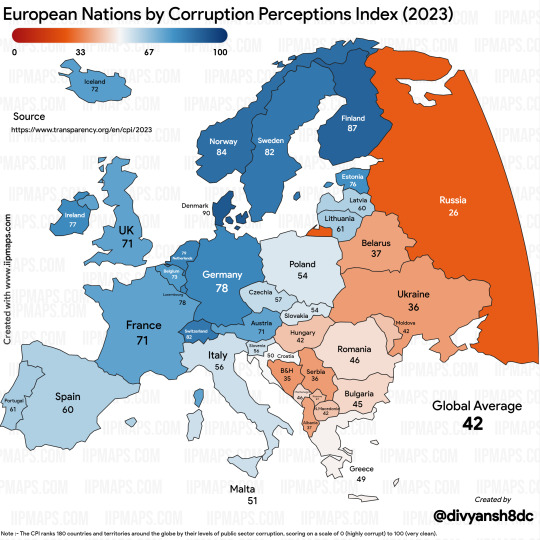
European Nations by Corruption Perceptions Index(2023)
by Specific_Ad_685
Note :- Corruption Perceptions Index is a report released annually by Transparency International for generally Public Sector and Public Institutions based corruption.
It measures corruption on a scale of 0 to 100 with 0 meaning highly corrupt(basically fully corrupt) and 100 meaning no corruption and fully clean.
The CPI is calculated using 13 different data sources from 12 different institutions that capture perceptions of corruption within the past two years.
13 data sources were used to construct the Corruption Perceptions Index (CPI)
2023:
1. African Development Bank Country Policy and Institutional Assessment 2021
2. Bertelsmann Stiftung Sustainable Governance Indicators 2022
3. Bertelsmann Stiftung Transformation Index 2024
4. Economist Intelligence Unit Country Risk Service 2023
5. Freedom House Nations in Transit 2023
6. Global Insight Country Risk Ratings 2022
7. IMD World Competitiveness Center World Competitiveness Yearbook Executive Opinion Survey 2023
8. Political and Economic Risk Consultancy Asian Intelligence 2023
9. The PRS Group International Country Risk Guide 2023
10. World Bank Country Policy and Institutional Assessment 2022
11. World Economic Forum Executive Opinion Survey 2023
12. World Justice Project Rule of Law Index Expert Survey 2023
13. Varieties of Democracy (V-Dem v. 13) 2023
112 notes
·
View notes
Text
We knew this was coming, and it's here...
Teen Girls Confront an Epidemic of Deepfake Nudes in Schools
Using artificial intelligence, middle and high school students have fabricated explicit images of female classmates and shared the doctored pictures.
April 8, 2024
After boys at Francesca Mani’s high school fabricated and shared explicit images of girls last year, she and her mother, Dorota, began urging schools and legislators to enact tough safeguards.Shuran Huang
After boys at Francesca Mani’s high school fabricated and shared explicit images of girls last year, she and her mother, Dorota, began urging schools and legislators to enact tough safeguards.Shuran Huang
Westfield Public Schools held a regular board meeting in late March at the local high school, a red brick complex in Westfield, N.J., with a scoreboard outside proudly welcoming visitors to the “Home of the Blue Devils” sports teams.
But it was not business as usual for Dorota Mani.
In October, some 10th-grade girls at Westfield High School — including Ms. Mani’s 14-year-old daughter, Francesca — alerted administrators that boys in their class had used artificial intelligence software to fabricate sexually explicit images of them and were circulating the faked pictures. Five months later, the Manis and other families say, the district has done little to publicly address the doctored images or update school policies to hinder exploitative A.I. use.
“It seems as though the Westfield High School administration and the district are engaging in a master class of making this incident vanish into thin air,” Ms. Mani, the founder of a local preschool, admonished board members during the meeting.
In a statement, the school district said it had opened an “immediate investigation” upon learning about the incident, had immediately notified and consulted with the police, and had provided group counseling to the sophomore class.
Tenth-grade girls at Westfield High School in New Jersey learned last fall that male classmates had fabricated sexually explicit images of them and shared them.Peter K. Afriyie/Associated Press
“All school districts are grappling with the challenges and impact of artificial intelligence and other technology available to students at any time and anywhere,” Raymond González, the superintendent of Westfield Public Schools, said in the statement.
Blindsided last year by the sudden popularity of A.I.-powered chatbots like ChatGPT, schools across the United States scurried to contain the text-generating bots in an effort to forestall student cheating. Now a more alarming A.I. image-generating phenomenon is shaking schools.
Boys in several states have used widely available “nudification” apps to pervert real, identifiable photos of their clothed female classmates, shown attending events like school proms, into graphic, convincing-looking images of the girls with exposed A.I.-generated breasts and genitalia. In some cases, boys shared the faked images in the school lunchroom, on the school bus or through group chats on platforms like Snapchat and Instagram, according to school and police reports.
Such digitally altered images — known as “deepfakes” or “deepnudes” — can have devastating consequences. Child sexual exploitation experts say the use of nonconsensual, A.I.-generated images to harass, humiliate and bully young women can harm their mental health, reputations and physical safety as well as pose risks to their college and career prospects. Last month, the Federal Bureau of Investigation warned that it is illegal to distribute computer-generated child sexual abuse material, including realistic-looking A.I.-generated images of identifiable minors engaging in sexually explicit conduct.
Yet the student use of exploitative A.I. apps in schools is so new that some districts seem less prepared to address it than others. That can make safeguards precarious for students.
“This phenomenon has come on very suddenly and may be catching a lot of school districts unprepared and unsure what to do,” said Riana Pfefferkorn, a research scholar at the Stanford Internet Observatory, who writes about legal issues related to computer-generated child sexual abuse imagery.
At Issaquah High School near Seattle last fall, a police detective investigating complaints from parents about explicit A.I.-generated images of their 14- and 15-year-old daughters asked an assistant principal why the school had not reported the incident to the police, according to a report from the Issaquah Police Department. The school official then asked “what was she supposed to report,” the police document said, prompting the detective to inform her that schools are required by law to report sexual abuse, including possible child sexual abuse material. The school subsequently reported the incident to Child Protective Services, the police report said. (The New York Times obtained the police report through a public-records request.)
In a statement, the Issaquah School District said it had talked with students, families and the police as part of its investigation into the deepfakes. The district also “shared our empathy,” the statement said, and provided support to students who were affected.
The statement added that the district had reported the “fake, artificial-intelligence-generated images to Child Protective Services out of an abundance of caution,” noting that “per our legal team, we are not required to report fake images to the police.”
At Beverly Vista Middle School in Beverly Hills, Calif., administrators contacted the police in February after learning that five boys had created and shared A.I.-generated explicit images of female classmates. Two weeks later, the school board approved the expulsion of five students, according to district documents. (The district said California’s education code prohibited it from confirming whether the expelled students were the students who had manufactured the images.)
Michael Bregy, superintendent of the Beverly Hills Unified School District, said he and other school leaders wanted to set a national precedent that schools must not permit pupils to create and circulate sexually explicit images of their peers.
“That’s extreme bullying when it comes to schools,” Dr. Bregy said, noting that the explicit images were “disturbing and violative” to girls and their families. “It’s something we will absolutely not tolerate here.”
Schools in the small, affluent communities of Beverly Hills and Westfield were among the first to publicly acknowledge deepfake incidents. The details of the cases — described in district communications with parents, school board meetings, legislative hearings and court filings — illustrate the variability of school responses.
The Westfield incident began last summer when a male high school student asked to friend a 15-year-old female classmate on Instagram who had a private account, according to a lawsuit against the boy and his parents brought by the young woman and her family. (The Manis said they are not involved with the lawsuit.)
After she accepted the request, the male student copied photos of her and several other female schoolmates from their social media accounts, court documents say. Then he used an A.I. app to fabricate sexually explicit, “fully identifiable” images of the girls and shared them with schoolmates via a Snapchat group, court documents say.
Westfield High began to investigate in late October. While administrators quietly took some boys aside to question them, Francesca Mani said, they called her and other 10th-grade girls who had been subjected to the deepfakes to the school office by announcing their names over the school intercom.
That week, Mary Asfendis, the principal of Westfield High, sent an email to parents alerting them to “a situation that resulted in widespread misinformation.” The email went on to describe the deepfakes as a “very serious incident.” It also said that, despite student concern about possible image-sharing, the school believed that “any created images have been deleted and are not being circulated.”
Dorota Mani said Westfield administrators had told her that the district suspended the male student accused of fabricating the images for one or two days.
Soon after, she and her daughter began publicly speaking out about the incident, urging school districts, state lawmakers and Congress to enact laws and policies specifically prohibiting explicit deepfakes.
“We have to start updating our school policy,” Francesca Mani, now 15, said in a recent interview. “Because if the school had A.I. policies, then students like me would have been protected.”
Parents including Dorota Mani also lodged harassment complaints with Westfield High last fall over the explicit images. During the March meeting, however, Ms. Mani told school board members that the high school had yet to provide parents with an official report on the incident.
Westfield Public Schools said it could not comment on any disciplinary actions for reasons of student confidentiality. In a statement, Dr. González, the superintendent, said the district was strengthening its efforts “by educating our students and establishing clear guidelines to ensure that these new technologies are used responsibly.”
Beverly Hills schools have taken a stauncher public stance.
When administrators learned in February that eighth-grade boys at Beverly Vista Middle School had created explicit images of 12- and 13-year-old female classmates, they quickly sent a message — subject line: “Appalling Misuse of Artificial Intelligence” — to all district parents, staff, and middle and high school students. The message urged community members to share information with the school to help ensure that students’ “disturbing and inappropriate” use of A.I. “stops immediately.”
It also warned that the district was prepared to institute severe punishment. “Any student found to be creating, disseminating, or in possession of AI-generated images of this nature will face disciplinary actions,” including a recommendation for expulsion, the message said.
Dr. Bregy, the superintendent, said schools and lawmakers needed to act quickly because the abuse of A.I. was making students feel unsafe in schools.
“You hear a lot about physical safety in schools,” he said. “But what you’re not hearing about is this invasion of students’ personal, emotional safety.”
Natasha Singer writes about technology, business and society. She is currently reporting on the far-reaching ways that tech companies and their tools are reshaping public schools, higher education and job opportunities. More about Natasha Singer
A version of this article appears in print on April 11, 2024, Section B, Page 1 of the New York edition with the headline: Fake A.I. Nudes Create Crisis in Schools. Order Reprints | Today’s Paper | Subscribe
63 notes
·
View notes
Text
"The U.S. government is entering a new era of collaboration with Native American and Alaska Native leaders in managing public lands and other resources, with top federal officials saying that incorporating more Indigenous knowledge into decision-making can help spur conservation and combat climate change.
Federal emergency managers on Thursday also announced updates to recovery policies to aid tribal communities in the repair or rebuilding of traditional homes or ceremonial buildings after a series of wildfires, floods and other disasters around the country.
With hundreds of tribal leaders gathering in Washington this week for an annual summit, the Biden administration is celebrating nearly 200 new agreements that are designed to boost federal cooperation with tribes nationwide.
The agreements cover everything from fishery restoration projects in Alaska and the Pacific Northwest to management of new national monuments in the Southwestern U.S., seed collection work in Montana and plant restoration in the Great Smoky Mountains.
“The United States manages hundreds of millions of acres of what we call federal public lands. Why wouldn’t we want added capacity, added expertise, millennia of knowledge and understanding of how to manage those lands?” U.S. Interior Assistant Secretary Bryan Newland said during a panel discussion.
The new co-management and co-stewardship agreements announced this week mark a tenfold increase over what had been inked just a year earlier, and officials said more are in the pipeline.
Newland, a citizen of the Bay Mills Indian Community in northern Michigan, said each agreement is unique. He said each arrangement is tailored to a tribe’s needs and capacity for helping to manage public lands — and at the very least assures their presence at the table when decisions are made.
The federal government is not looking to dictate to tribal leaders what a partnership should look like, he said...
The U.S. government controls more than a quarter of the land in the United States, with much of that encompassing the ancestral homelands of federally recognized tribes...
Tribes and advocacy groups have been pushing for arrangements that go beyond the consultation requirements mandated by federal law.
Researchers at the University of Washington and legal experts with the Native American Rights Fund have put together a new clearinghouse on the topic. They point out that public lands now central to the country’s national heritage originated from the dispossession and displacement of Indigenous people and that co-management could present on opportunity for the U.S. to reckon with that complicated legacy...
In an attempt to address complaints about chronic underfunding across Indian Country, President Joe Biden on Wednesday signed an executive order on the first day of the summit that will make it easier for tribes to find and access grants.
Deanne Criswell, administrator of the Federal Emergency Management Agency, told tribal leaders Thursday that her agency [FEMA] began work this year to upgrade its disaster guidance particularly in response to tribal needs.
The Indigenous people of Hawaii have increasingly been under siege from disasters, most recently a devastating fire that killed dozens of people and leveled an entire town. Just last month, another blaze scorched a stretch of irreplaceable rainforest on Oahu.
Tribes in California and Oregon also were forced to seek disaster declarations earlier this year after severe storms resulted in flooding and mudslides...
Criswell said the new guidance includes a pathway for Native American, Alaska Native and Hawaiian communities to request presidential disaster declarations, providing them with access to emergency federal relief funding. [Note: This alone is potentially a huge deal. A presidential disaster declaration unlocks literally millions of dollars in federal aid and does a lot to speed up the response.]
The agency also is now accepting tribal self-certified damage assessments and cost estimates for restoring ceremonial buildings or traditional homes, while not requiring site inspections, maps or other details that might compromise culturally sensitive data."
-via AP, December 7, 2023
#united states#us politics#natural disasters#disaster relief#public lands#land back#indigenous#native american#first nations#indigineous people#sovereignty#president biden#biden administration#hope#good news#land management
592 notes
·
View notes
Text
Justice Minister Paul Van Tigchelt (Open VLD) is under fire for comments he made about migrants and their contribution to the Belgian economy.
Featuring as a guest on the podcast 'Talks With Charly', Van Tigchelt was asked about his views on whether it was possible to prevent migrants from entering Belgium, to which he replied: "Of course not. Something like that is impossible, unnecessary and undesirable."
He went on to emphasise the economic role migrants play here. "Who takes care of our care? Who will lay my water pipe? Who cleans my windows at home?"
Podcast host Charly Badibanga then took offence to the insinuation that migrants only contribute to Belgium via low-skilled work, and the Justice Minister quickly sought to nuance his comments. "Sorry for expressing myself incorrectly, but take away migration and our economy will come to a standstill."
He added that figures such as directors Adil El Arbi and Bilall Fallah and former football players Marouane Fellaini and Vincent Kompany are a testament to the "wealth" that migration has brought to Belgium.
'Stereotypical'
Van Tigchelt's comments demonstrated a "stereotypical" view of work performed by migrants but was not off the mark regarding the economic impact of reduced migration, says Eva Van Belle, a migration and labour expert at VUB.
"It is difficult to predict the impact a migration policy change would have on the economy, but what we do know is that the rate of migration we have today is good for growth," she told The Brussels Times. "There is a positive fiscal effect too, as migrants contribute more to public finances than what they cost. If we stopped migration, this positive effect would disappear."
The perception that a high proportion of migrants work in low-skilled positions is due to the fact that Belgium lacks any clear strategy to attract high-skilled individuals. In addition, a cinched domestic labour market coupled with discrimination faced by people from migrant backgrounds pushes many of them to unskilled positions. Nevertheless, migrants make up significant portions of professional sectors too, such as IT, healthcare and consulting.
Migration is an enormous topic for political parties ahead of federal elections on 9 June. Van Tigchelt's liberal party Open VLD wants to increase controls at EU borders and make family reunification conditions much more stringent. The party calls for more humane conditions for asylum seekers awaiting a decision on their application despite overseeing a worsening reception crisis since being in government.
38 notes
·
View notes
Text
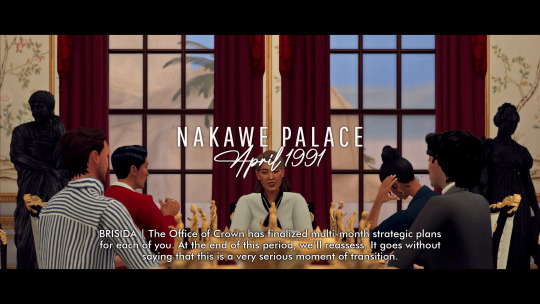

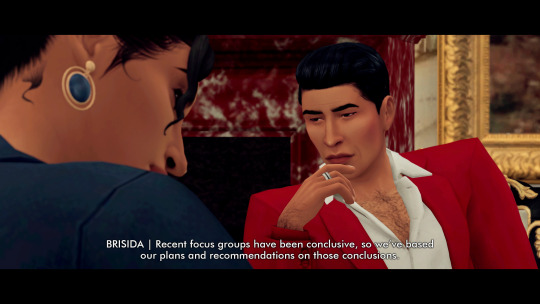
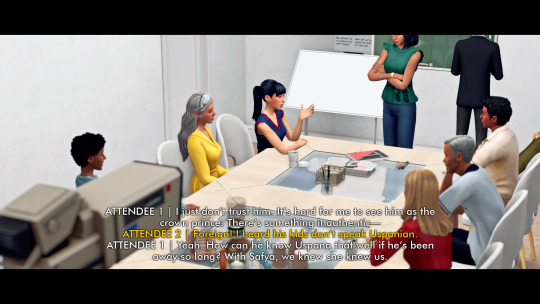
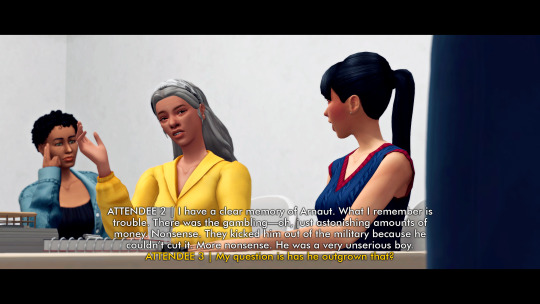
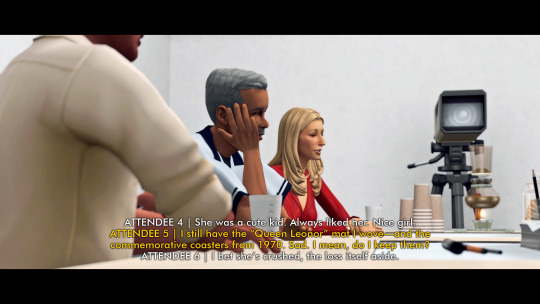
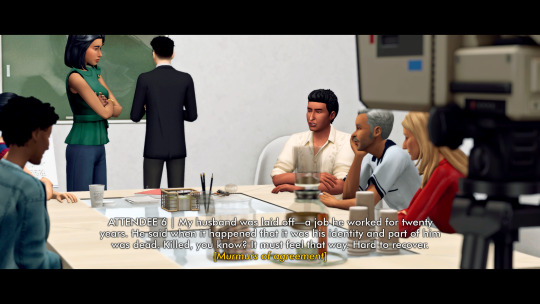
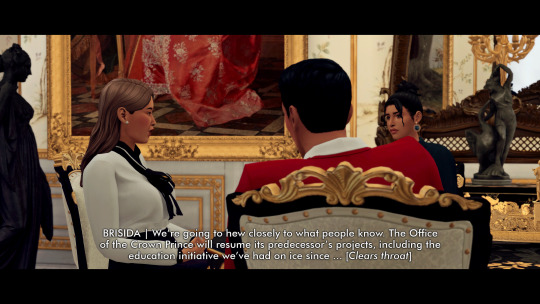

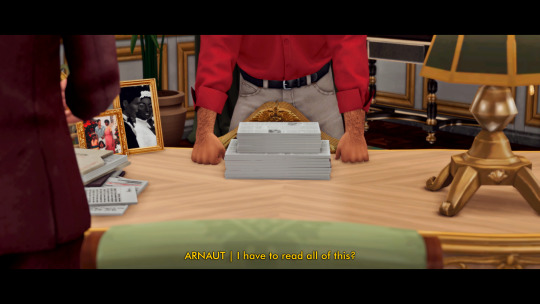


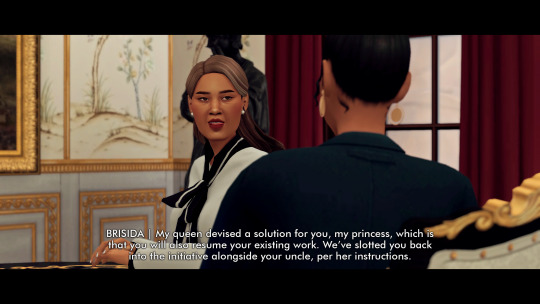
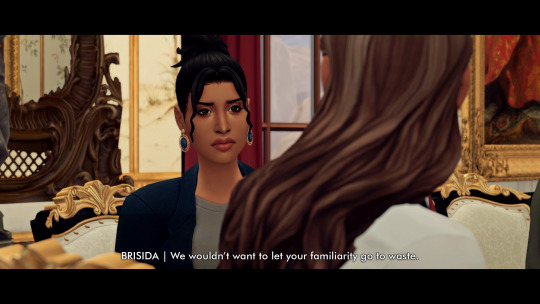
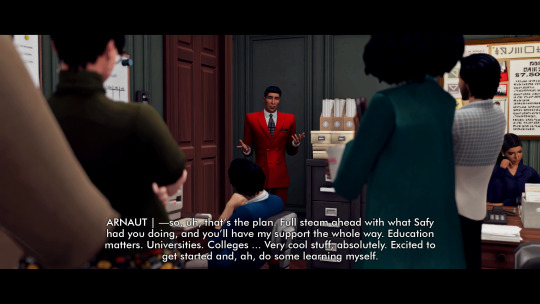

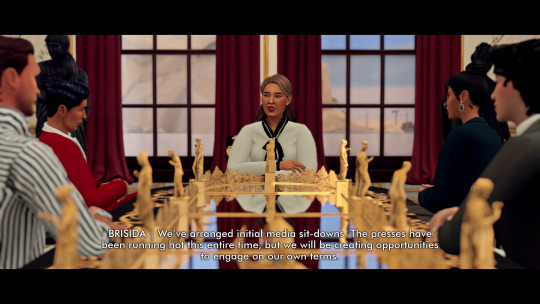
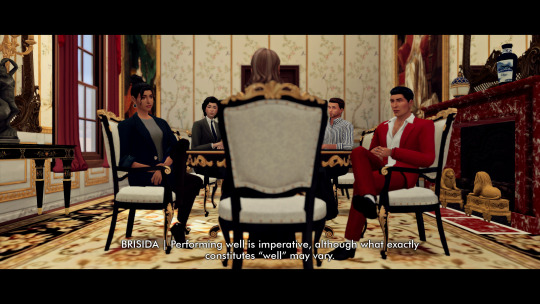



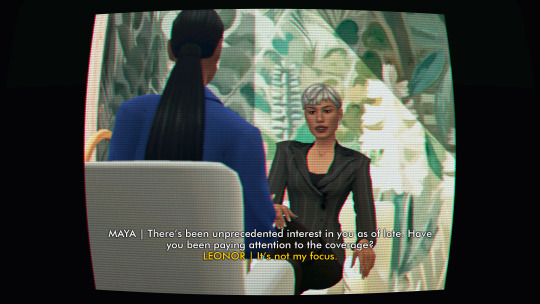
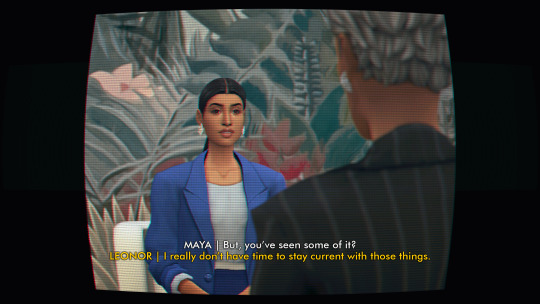
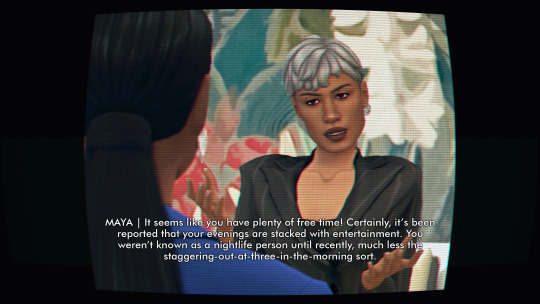



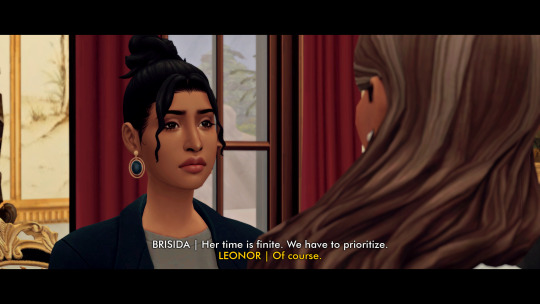
𝐍𝐎. 𝟏 ❛ 𝐡𝐨𝐭 𝐚𝐧𝐝 𝐟𝐚𝐬𝐭 ❜ | NAKAWE PALACE, APRIL 1991
❧ 𝐝𝐢𝐫𝐞𝐜𝐭𝐨𝐫𝐲 / 𝐛𝐞𝐠𝐢𝐧𝐧𝐢𝐧𝐠 / 𝐩𝐫𝐞𝐯𝐢𝐨𝐮𝐬 / 𝐧𝐞𝐱𝐭.
❛ Leonor had always worked. She could not remember a time when she hadn’t; in even her earliest memories, she was a focused observer on the periphery of business underway. Like designated heirs before her, she lived according to a strict regime premised on the idea that education must be experiential. Instead of attending school, Leonor’s day saw her shuffled between academic tutors and the myriad meetings that occupied her mother and grandmother. It eventually became insufficient to only sit on the sidelines, however silent and attuned. Instead, Beatriz would—without a glance, as her eyes remained fixed upon some poor minister or combative legislator—throw out a question Leonor came to know well. Her grandmother would ask, nonchalant, “ What about it, Leonor? "
❧ progress :^)
𝐬𝐜𝐞𝐧𝐞 𝐜𝐨𝐧𝐭𝐢𝐧𝐮𝐞𝐝 & 𝐭𝐫𝐚𝐧𝐬𝐜𝐫𝐢𝐩𝐭 ↓
Uspana’s public employees knew they held bit parts in the education of their future sovereigns. They played along when necessary but, for the most part, could ignore the occasional intrusion. Now an adult, Leonor wondered what they truly thought during those moments when the queen pretended to consult with her grandchild on questions most adults would find confounding. It was routine for Leonor. It had been routine for those before her. Yet, she understood that they were all extraordinary—that their lives were tied up in unyielding bows of pageantry and ritual, even behind ostensibly closed doors, while millions of other children were allowed to be immature and irresponsible.
Even the children of politicians had childhoods. Despite lacking many firsthand comparisons, she had wistfully perceived the gulf between herself and Arturo on many occasions. The difference between the child of a politician and the child of a royal was simple: he could be anything he wanted to be, but she was born for one singular purpose. That purpose was too immense for childhood. One had to give, and it was for each successive generation a foregone conclusion as to which must go.
Leonor could recall with perfect clarity the first time her grandmother had posed the question. A dozen pairs of eyes fell upon her while she sat like a stone in a rigid antique chair against the boardroom’s far wall. Barely ten years old, she felt the room go sideways as her heart raced and her skin warmed. Her feet didn’t touch the floor in that chair; she had held them perfectly still as she stared at the shiny black leather of her shoes. In her mind, she scrambled for an answer to a question whose operative words she could not define.
Still, she understood something crucial. Beatriz didn’t want her opinion on the minutiae of the budget being discussed. What she wanted was to know Leonor had apprehended a different, much more crucial element of the meeting—if she understood, as any good ruler must, that all politics are inseparable from personality. Leonor finally repeated something she heard a minister say, choosing with care the person whose words she would echo. She knew that this man was an enemy of the queen. She also knew that Beatriz was currently pretending to like him because he was despised by another colleague, one whom Beatriz disliked even more. Leonor couldn’t wrap her child’s mind around the fiscal debate, nor did she know the full details of these relationships. She had nonetheless paid attention to them, and she understood the dynamics the way other children might the convoluted conflicts of a schoolyard playground.
It was in this way that she developed the skills her work required. Some of it came naturally. Leonor knew herself to be intelligent, perceptive, and diligent. As she grew older, questions of policy and public relations became easier to tackle. She could weigh in on debates with her own opinions, and she could form those opinions based in part on her command of the ever-shifting social networks that so often controlled the workings of government. Sometimes, Beatriz embarrassed her. She sat back, smug and prideful, other times. More than just pleasing her grandmother, being able to actively serve the Crown was fulfilling. It was satisfying work—work laid out, not just by custom, but by divinity itself. Leonor believed this was indeed what she had been born to do, and the pursuit of doing it well gave her life clear, constant purpose.
In early 1991, she no longer felt that way. Her purpose had been taken in the only legitimate way available; the death that triggered the process, meanwhile, had robbed her of the desire to find a new purpose. It was possible she would never be satisfied or fulfilled again, and she toyed with the idea of accepting that proposition. No one seemed to care what shape her life took next. She could rot in her apartment for years if she wanted.
Yet, soon enough, a realization crawled its way from deep inside her. She could not completely hold back the unpleasant feeling of stagnation that such a life threatened. Leonor was not ready to entomb herself. She was still intelligent, perceptive, and diligent. She had taken to her work for more reasons than just obligation and routine. Grief had obliterated much, but those fundamentals remained the same. Time’s ceaseless passage, stretching days into weeks and weeks into months, eroded enough of the mind-numbing pain to reveal this basic truth. Leonor needed to do something. Although there was nothing she desired to do, passion was not a prerequisite. The choice made itself: Leonor, in truth, was only really capable of doing one thing.
TRANSCRIPT:
BRISIDA | The Office of Crown has finalized multi-month strategic plans for each of you. At the end of this period, we’ll reassess. It goes without saying that this is a very serious moment of transition.
BRISIDA | We have to change your positions in the world—overnight, basically. It’ll take longer to sell everyone on that, but we’re committed to persuasion. We have no other choice.
BRISIDA | Recent focus groups have been conclusive, so we’ve based our plans and recommendations on those conclusions.
ATTENDEE 1 | I just don’t trust him. It’s hard for me to see him as the crown prince. There’s something inauthentic—
ATTENDEE 2 | Foreign! I heard his kids don’t speak Uspanian.
ATTENDEE 1 | Yeah. How can he know Uspana that well if he’s been away so long? With Safya, we knew she knew us.
ATTENDEE 2 | I have a clear memory of Arnaut. What I remember is trouble. There was the gambling—oh, just astonishing amounts of money. Nonsense. They kicked him out of the military because he couldn’t cut it. More nonsense. He was a very unserious boy.
ATTENDEE 3 | My question is has he outgrown that?
ATTENDEE 4 | She was a cute kid. Always liked her. Nice girl.
ATTENDEE 5 | I still have the “Queen Leonor” mat I wove—and the commemorative coasters from 1970. Sad. I mean, do I keep them?
ATTENDEE 6 | I bet she’s crushed, the loss itself aside.
ATTENDEE 6 | My husband was laid off—a job he worked for twenty years. He said when it happened that it was his identity and part of him was dead. Killed, you know? It must feel that way. Hard to recover.
[Murmurs of agreement]
BRISIDA | We’re going to hew closely to what people know. The Office of the Crown Prince will resume its predecessor’s projects, including the education initiative we’ve had on ice since … [Clears throat]
BRISIDA | Think of it as training wheels, for now.
ARNAUT | I have to read all of this?
AIDE 2 | The princess would, my prince.
ARNAUT | By tomorrow?
[Arnaut sighs]
BRISIDA | My queen devised a solution for you, my princess, which is that you will also resume your existing work. We’ve slotted you back into the initiative alongside your uncle, per her instructions.
BRISIDA | We wouldn’t want to let your familiarity go to waste.
ARNAUT | —so, uh, that’s the plan. Full steam ahead with what Safy had you doing, and you’ll have my support the whole way. Education matters. Universities. Colleges … Very cool stuff, absolutely. Excited to get started and, ah, do some learning myself.
[Leonor groans]
BRISIDA | We’ve arranged initial media sit-downs. The presses have been running hot this entire time, but we will be creating opportunities to engage on our own terms.
BRISIDA | Performing well is imperative, although what exactly constitutes “well” may vary.
BERNARDO | You’re in the education business now. There’s been talk in the assembly of revisiting the USI Act of 1981. Are you in favor?
ARNAUT | Well, that would depend.
BERNARDO | On … ?
ARNAUT | If you can tell me what the “USI Act of 1981” is.
MAYA | There’s been unprecedented interest in you as of late. Have you been paying attention to the coverage?
LEONOR | It’s not my focus.
MAYA | But, you’ve seen some of it?
LEONOR | I really don’t have time to stay current with those things.
MAYA | It seems like you have plenty of free time! Certainly, it’s been reported that your evenings are stacked with entertainment. You weren’t known as a nightlife person until recently, much less the staggering-out-at-three-in-the-morning sort.
LEONOR | Sure, I go out from time to time.
MAYA | Alright. Diplomatic.
MAYA | Let’s switch gears. Will you be speaking to Mencia Cipac?
LEONOR | Nothing has come across my desk yet.
MAYA | It’s rumored she’s starting a new project—topic: you.
LEONOR | That’s Miss Cipac’s business. I wish her well.
MAYA | Would you speak to her?
LEONOR | I’m speaking to you.
LEONOR | Will Mother Beatriz be meeting with us soon?
BRISIDA | She is scheduled to meet with Prince Arnaut next week.
BRISIDA | Her time is finite. We have to prioritize.
LEONOR | Of course.
44 notes
·
View notes